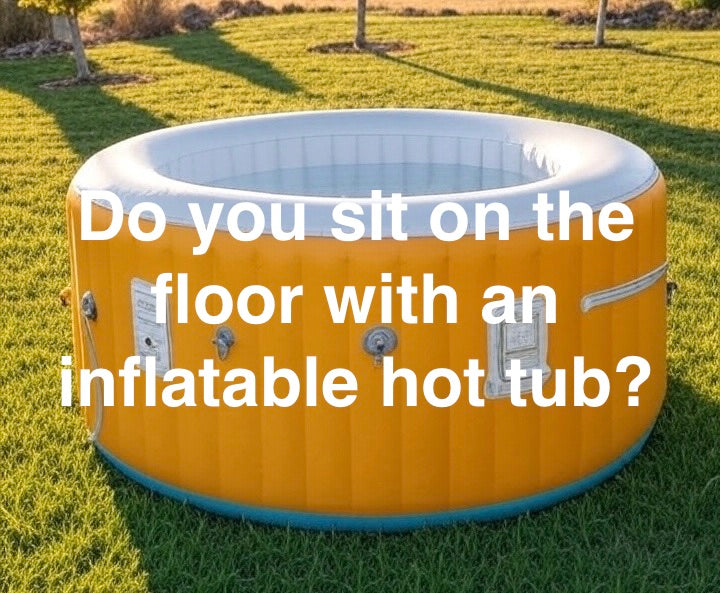
Do You Sit on the Floor with an Inflatable Hot Tub?
Ever wondered if you’re meant to sit on the floor in inflatable spas?
Short answer: yes, you usually do—but the experience can vary wildly. Some people find it fine for a quick soak, while others end up wriggling around like kids at the back of the cinema trying to get comfy. The good news? There are plenty of clever ways to make it better.


The Short Answer: Yes, But There's More to It
Understanding the Inflatable Hot Tub Design
The absence of built-in, hard-shell seating
Unlike traditional hot tubs, inflatable models don’t come with moulded seats. That means no contoured loungers or built-in headrests to lean against. Instead, you’re sitting lower, closer to the floor of the spa.
It’s not necessarily a bad thing—it just means expectations need adjusting.
How the cushioned floor provides basic comfort
Most inflatable hot tubs are built with a cushioned, air-filled floor. It’s softer than sitting on concrete or decking, and for shorter dips, it can feel perfectly fine.
Think of it like perching on a padded camping mat—it does the job, but it’s not exactly five-star luxury.
The role of water buoyancy
Water does some of the heavy lifting when it comes to comfort. Once you’re settled, buoyancy takes pressure off your body, so it’s not as harsh as sitting on a hard surface.
That said, after a long soak you might still notice the difference compared to a spa with proper ergonomic seating.
Why You Might Want More Than Just the Floor
The Limitations of Sitting on the Bottom
Issues with height and water level (being too low)
When you’re sitting on the floor, you’re naturally lower in the water. For taller people, that might mean only your shoulders and head stick out nicely above the surface. For shorter adults, it can feel like you’re bobbing with your chin at water level.
Potential for discomfort on hard surfaces like concrete or decking
The floor itself may be cushioned, but if the tub is set up on a hard or uneven surface, you’ll feel it underneath. Over time, this can lead to sore spots and takes away from that relaxed, spa-like vibe.
Strain on knees and back when getting in and out
Getting up from a floor-level seat can be tricky, especially when you’re wet and everything is slippery. For older users or anyone with knee or back niggles, the low seating height can be more hassle than relaxation.
Solutions for Enhanced Comfort and Seating

Inflatable Hot Tub Seats and Boosters
How they work (inflate and sit on them)
Dedicated hot tub seats or booster cushions are popular add-ons. They’re usually inflatable or weighted with water, so you pop them in the spa, sit on top, and enjoy being raised a little higher.
Benefits (raises you up, added cushion)
They give you that extra lift, taking pressure off your back and making it easier to get in and out. Plus, they stop the constant shuffling about trying to find a comfy spot.
Considerations (can they float or move? are they stable?)
Not all seats are created equal. Some are prone to floating or sliding if they’re not weighted properly. Checking reviews before buying can save you from frustration later.
DIY and Alternative Seating Solutions
Using waterproof pillows or cushions
Plenty of families use waterproof spa pillows or even pool floats as makeshift cushions. They’re inexpensive and easy to move around, so everyone can find their perfect spot.
The use of foam mats or interlocking gym tiles underneath the tub
Another trick is to lay foam mats or interlocking tiles under your hot tub before filling it. This not only adds a layer of comfort beneath the cushioned floor but also helps protect the base from wear and tear.
Beyond Seating: Accessories for a Better Experience
Attachable cup holders and snack trays
Let’s be honest—half the fun of a hot tub is having a cheeky drink or snack in hand. Clip-on cup holders and trays keep everything close without the risk of soggy crisps.
Headrests and pillows for neck support
For longer soaks, an inflatable headrest or spa pillow can make all the difference. No more awkwardly leaning against the wobbly side wall.
Insulated mats for both comfort and energy efficiency
Insulated ground mats not only add a little more cushioning but also keep heat from escaping through the base. A double win: more comfort and lower energy bills.
Making the Final Decision: What's Right for You?
Factors to Consider Before Buying Seating
Your height and body type
If you’re tall, sitting on the floor might feel fine. Shorter adults, on the other hand, may prefer a booster to avoid feeling swallowed by the water.
The number of people who will use the hot tub
Four people sitting on the floor might work for a quick dip with the kids, but for a longer family soak, a few seat cushions can transform the experience.
Your personal preference for comfort and relaxation
Some people are happy to perch on the floor for a casual splash. Others want that spa-like feel with full support and accessories. It all comes down to what relaxation means to you.
Comparing Inflatable Hot Tubs to Traditional Spas
Seating differences
Traditional spas usually come with moulded, ergonomic seats designed for comfort and hydrotherapy. Inflatable spas are simpler—you sit on the floor or add cushions to customise your setup.
Cost, portability, and maintenance trade-offs
Inflatables are cheaper, easier to move, and simpler to set up. The trade-off is comfort and durability. Traditional spas cost more upfront but usually deliver the “luxury” feel people imagine when they think of hot tubs.
Final Thoughts

Yes, you sit on the floor in an inflatable hot tub—but that doesn’t mean you have to put up with sore backs or stiff knees. With a few clever accessories, or by picking the right model, you can make your soak every bit as enjoyable as you hoped.
Inflatable spas are about finding balance: affordability, fun, and just enough comfort to make family evenings or lazy weekends something special.
Have you checked out our other posts?
What Are The Downsides Of Inflatable Hot Tubs?
What Are The Negatives Of Inflatable Hot Tubs?
How Long Do Inflatable Hot Tubs Usually Last?
What Is The Life Expectancy Of An Inflatable Hot Tub?
Do Inflatable Hot Tubs Puncture Easily?
How Often Should I Change My Inflatable Hot Tub Filter?
What Is The Best Thing To Clean The Inside Of An Inflatable Hot Tub?
Are Inflatable Hot Tubs A Lot Of Maintenance?
Should You Leave An Inflatable Hot Tub On All The Time?
Are Inflatable Hot Tubs Durable?



Leave a comment